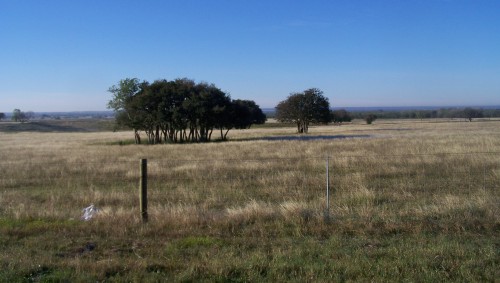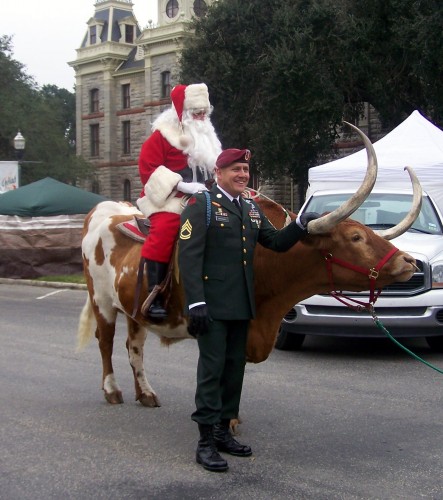
This last Saturday was the second day of Christmas on the Square in Goliad, Texas. I had a table there, as a local author, but the cold was so pronounced that the whole event was rather a bust … but it did mean that folding up and coming home early allowed some time for taking pictures on the way back. This is a part of Texas which overlies the Eagle Ford Shale formation, and over the last five years I have noted a good many changes along the route, and in the small towns that we pass through on a semi-regular basis.
 Sgt. Mom
Sgt. Mom
History Friday:The Sutton-Taylor Feud
The feud between the Suttons and the Taylors was one of those epic Texas feuds which convulsed DeWitt County in the decade following the Civil War. It might even have begun earlier in a somewhat more restrained way, but there is nothing besides speculation on the part of contemporary journalists by way of evidence. Both families originated in South Carolina, both settled in DeWitt County … and in the hard times which followed on the humiliating defeat of the South and the even more humiliating Reconstruction, they squared off against each other. The feud lasted nearly a decade, at a cost of at least 35 lives. Participants in it included the notorious John Wesley Hardin, who was related by marriage to the Taylors. Some historians have described the feud as a bitter continuation of the Civil War, between die-hard Confederate partisans and those roughly aligned with the forces of Reconstruction law and order.
Obituary – Historian and Writer T.R. Fehrenbach
Late to the party on this one, since I dropped my newspaper subscription a couple of years ago, but one of the ladies of the Red Hat circle I belong to mentioned this to me last night at our monthly dinner out. She couldn’t quite recall his name, but outlined enough that I figured it out, and confirmed by routine googlectomy this morning. He was our own local Victor Davis Hanson; I never met him in person, but I had friends and associates who had. A fantastic historian,(and a military veteran as well, since he was of that era) but personally rather bland and plain-spoken. Two of his books, Lone Star and Comanches
are on my desk shelf within reach, and I cannot recommend them highly enough.
Book Review – Homeland Insecurity: Dark Invasion
This book is subtitled 1915 – Germany’s Secret War by Howard Blum. It is a fascinating and very readable account of a corner of American history not very well explored lately; what happened in the early years of WWI, when the assassination of an Austrian arch-duke set Western Europe on fire and America remained tenuously neutral. Very soon it became apparent to those in highest authority in Germany that the war would not be a walk in the park; that it would be a long and bloody war of attrition. In those circumstances, the United States could not be easily dismissed even if it was considered such a backwater by the German general staff that it was lumped together with Mexico, to the disgust of Captain Franz von Papen. He was then assigned as military attaché to the German embassy in New York in 1913 but in 1915 he was tasked with recruiting spies and saboteurs to wreak havoc.
Technically, the United States was a neutral, although quite a fair number of the wealthy social elite as well as the political leadership of the time were inclined to favor the British, and maintained strong cultural ties with England. Business and financial ties also favored the Allies and considerable agricultural and industrial bounty flowed freely to England, France and Russia, to the indignation of the German government. This was fiendishly one-sided neutrality, to their way of thinking. Von Papen and his fellows dove into a covert war with considerable relish, although there was the danger (a real one, as it turned out) that German efforts to hamper aid to the Allies might backfire, and alienate the U.S. out of neutrality and into open war against Germany.
